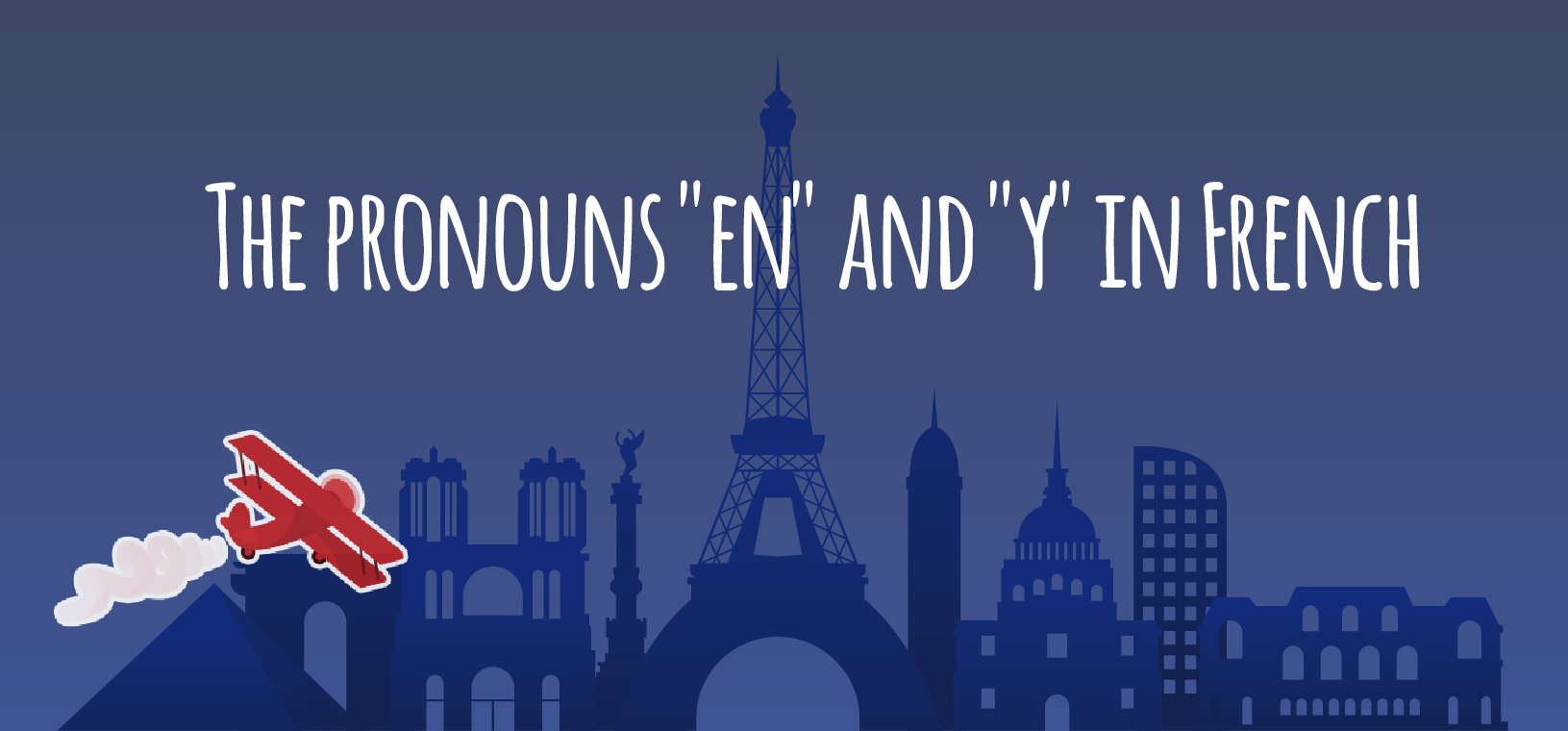The pronouns “en” and “y” in French

The pronouns “en” and “y” in French
INDEX OF CONTENTS
- The pronoun ‘en’
- The adverbial pronoun ‘y’
- Very classic theme of French grammar
- Pronoun ‘y’ in French in common expressions
- The pronoun ‘y’ in French replaces
In this article we will deal with the pronouns “en” and “y” in French because although it is not difficult for many to use them, for others, their use does entail difficulties. These two pronouns present the problem for Spanish that they do not exist in our language. For that reason you have to learn to use it in French.
Complementary pronouns Y and EN are called adverbial pronouns or neutral pronouns because they can replace different types of complements in a sentence: direct object complements, indirect object complements, or circumstantial place complements.
The pronoun ‘en’
General rule. This pronoun replaces a name that carries the preposition of (Do not forget that the contract article “du” for example, is the contraction of the preposition “of” and the definite article “le”
“En” replaces:
A direct object preceded by: du, de, la, de l’: un. une. des; de, d; o or a numeral::
- Tu vex du fromage? – Oui, j’en veux
(Do you want cheese? – if I want some)
- Tu manges de la viande? – oui, j’en mange
(Do you eat the meat? – yes, I eat it)
- Tu bois de l’eau? – oui j’en bois
(Do you drink water? – yes I drink it)
- Elle a un livre? – oui, elle en a un
(Does she have a book? – Yes, she has one)
- As-tu pris une aspirin? – oui, jèn ai pris une
(Did you take an aspirin? – yes, I took one)
A verb complement introduced by the preposition of
- Tu t’ocuppes de la maison? Oui – Oui, je m’en ocuppe
(Do you take care of the house? Yes – yes, I take care of it)
ATTENTION ! – If the complement introduced by de is a personal name, it is used: moi, toi, lui, elle, nous, vous, eux, elles (I, you, he, she, we, you, they, they), it is that is, the stressed pronouns behind this preposition, because ‘En’ cannot replace people, only things:
- tu t’ocuppes de la petite fille – Oui, je m’occupe d’elle
(you take care of the little girl – if I take care of her)
A place complement preceded by: de, d ‘, du, de la, de l’, des (that is, a place complement that indicates the place where it comes from)
- tu viens de Madrid? – Oui, J’en viens.
(Are you coming from Madrid? – Yes, I’m going there).
- tu viens de Lycée? – Oui, J’en viens
(Are you coming from high school? – Yes, I am coming from there )
It is placed before the verb of which it is a complement like the rest of the personal pronouns:
- Il va arriver de Paris
(will arrive from Paris).
- Oui il goes in arriver
(Yes, it will happen).
But with the affirmative imperative it is placed behind , as is the case with the rest of complement personal pronouns:
- Je peux de manger des bonbons ?
(Can I have candy?)
The adverbial pronoun “and”
The adverbial pronoun “y” is used in French in the following cases:
To refer to places that are preceded by à and en;
Example:
- Demain, ils iront à Lyon. Ils s’y rendront en bus
(Tomorrow they will go to Lyon. They will arrive by bus).
It is also used to refer to places introduced in the sentence by the prepositions dans, devant, sous or sur.
Example:
- Le bus dépose les touristes sur le parking de l’hôtel. Il y est garé pour la nuit.
(The bus drops tourists in the hotel parking lot. It is parked there for the night).
Very classic theme of French grammar
The pronoun ‘y’ in French, like the pronoun EN, is a very classic subject of French grammar. I think this is for two main reasons. The first is that the pronoun ‘y’ in French is a pronoun after all, and French pronouns are a classic grammar topic. The second reason , more interesting in my opinion, is that the pronoun y in French is very typical of the French language and, in general, it does not exist in other languages. In Spanish for example, there is no pronoun really equivalent to the pronoun ‘y’ in French.
Let’s see for example the following sentence:
- J’aime Paris! Je vais y aller en juillet.
I like Paris! I am going there in July.
Pronoun Y in French in common expressions
For example, there are expressions such as “il ya”, “on y va”, “je m’y connais”, etc.
Examples:
- Il ya trois vélos dans le garage.
There are three bikes in the garage.
- Bon, on y va ?
Ok let’s go?
- En mécanique, moi, je m’y connais
In mechanics, I am an expert!
The pronoun Y in French replaces something introduced by the preposition À:
- “Je pense à mon travail et j’y pense souvent.”
(I think about my work and think about it often.)
Case 1) is much more frequent. First because there are few verbs that use the preposition À in a systematic way and second and above all, because the pronoun Y in French does not replace people. So case 2) is more occasional than 1).
Finally, and like the pronoun EN, the pronoun Y in French participates in the construction of various very common French expressions.
Finally and to say goodbye we want to highlight the importance of obtaining an official title. Here we leave you the next calls.


